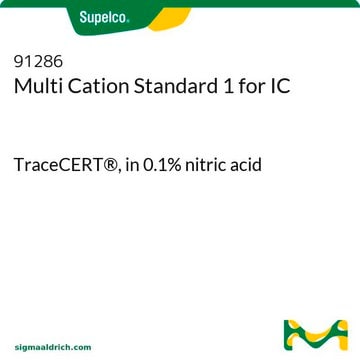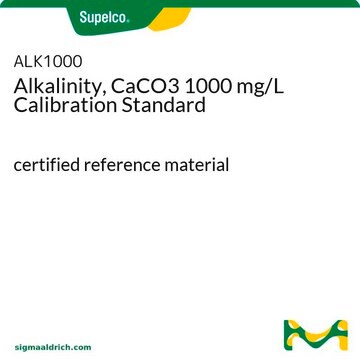68487
Oxalic acid concentrate
0.1 M (COOH)2 (0.2N), eluent concentrate for IC
Synonyme(s) :
Oxalic acid solution
Se connecterpour consulter vos tarifs contractuels et ceux de votre entreprise/organisme
About This Item
Formule linéaire :
HOOCCOOH
Numéro CAS:
Poids moléculaire :
90.03
Numéro MDL:
Code UNSPSC :
12161700
ID de substance PubChem :
Nomenclature NACRES :
NB.21
Produits recommandés
Niveau de qualité
Forme
liquid
Concentration
0.1 M (COOH)2 (0.2N)
Technique(s)
ion chromatography: suitable
Chaîne SMILES
OC(=O)C(O)=O
InChI
1S/C2H2O4/c3-1(4)2(5)6/h(H,3,4)(H,5,6)
Clé InChI
MUBZPKHOEPUJKR-UHFFFAOYSA-N
Vous recherchez des produits similaires ? Visite Guide de comparaison des produits
Application
Metrohm IC application note AN-C-139: Cations andamines in the water-steam cycle.
Metrohm IC application note AN-C-138: Zinc,nickel, calcium, and magnesium in borated water of a pressurized water reactor(PWR).
Metrohm IC application note AN-C-113:Determination of lysine and standard cations in a lysine sample.
Metrohm IC application note AN-C-138: Zinc,nickel, calcium, and magnesium in borated water of a pressurized water reactor(PWR).
Metrohm IC application note AN-C-113:Determination of lysine and standard cations in a lysine sample.
Liaison
Visit the IC Portal to learn more
Produit(s) apparenté(s)
Réf. du produit
Description
Tarif
Code de la classe de stockage
12 - Non Combustible Liquids
Classe de danger pour l'eau (WGK)
nwg
Point d'éclair (°F)
Not applicable
Point d'éclair (°C)
Not applicable
Équipement de protection individuelle
Eyeshields, Gloves
Faites votre choix parmi les versions les plus récentes :
Déjà en possession de ce produit ?
Retrouvez la documentation relative aux produits que vous avez récemment achetés dans la Bibliothèque de documents.
Les clients ont également consulté
L K Massey et al.
Journal of agricultural and food chemistry, 49(9), 4262-4266 (2001-09-18)
Consumption of soybeans and food products made from them is increasing because of their desirable nutritional value. However, the oxalate content of seeds from 11 cultivars of soybean showed relatively high levels of total oxalate from 0.67 to 3.5 g/100
R de Water et al.
American journal of kidney diseases : the official journal of the National Kidney Foundation, 33(4), 761-771 (1999-04-09)
Urinary calcium oxalate (CaOx) crystals and crystal agglomerates are normally harmlessly excreted, but in nephrolithiasis they are retained by tubular epithelial cells and shifted into the renal interstitium. This crystalline material induces an inflammatory response consisting of an increase in
G M Gadd
Advances in microbial physiology, 41, 47-92 (1999-09-29)
The production of organic acids by fungi has profound implications for metal speciation, physiology and biogeochemical cycles. Biosynthesis of oxalic acid from glucose occurs by hydrolysis of oxaloacetate to oxalate and acetate catalysed by cytosolic oxaloacetase, whereas on citric acid
Y Nakagawa et al.
The Journal of clinical investigation, 76(4), 1455-1462 (1985-10-01)
One reason that some people are prone to calcium oxalate nephrolithiasis is that they produce urine that is subnormal in its ability to inhibit the growth of calcium oxalate crystals. We have identified in human urine a glycoprotein (GCI) that
A Amoroso et al.
Journal of the American Society of Nephrology : JASN, 12(10), 2072-2079 (2001-09-20)
Primary hyperoxaluria type 1 (PH1) is an autosomal recessive disorder that is caused by a deficiency of alanine: glyoxylate aminotransferase (AGT), which is encoded by a single copy gene (AGXT). Molecular diagnosis was used in conjunction with clinical, biochemical, and
Notre équipe de scientifiques dispose d'une expérience dans tous les secteurs de la recherche, notamment en sciences de la vie, science des matériaux, synthèse chimique, chromatographie, analyse et dans de nombreux autres domaines..
Contacter notre Service technique








